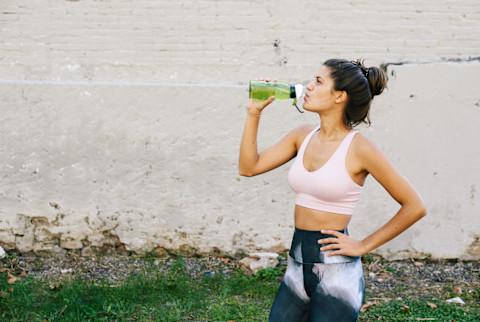Electrolytes vs Water: What Research Says Your Body Needs After Exercise

There's no better feeling than finishing a hard workout (the endorphin rush is real), and being drenched in sweat makes the feat feel even sweeter. This sweat is a clear indicator for folks that it's time to rehydrate. But chugging water alone isn't the best solution.
In fact, researchers recently reviewed post-exercise nutrition recovery strategies1 to evaluate the effectiveness of common practices. They rated habits related as strong, moderate, or weak according to the quality and consistency of past study findings.
As for electrolytes? They found strong evidence that including electrolytes in a post-workout routine improved recovery and performance during the following exercise sessions. Here's what you need to know.
Why rehydration is about more than just water
During exercise (particularly in hot or humid conditions), your body can lose over 4 liters of sweat an hour2—and some people can lose even more. Sweat not only consists of H2O but also key electrolytes, including minerals like sodium, potassium, calcium, and magnesium.
These minerals support everything from muscle contraction and nerve function to fluid balance3.
When these minerals are depleted, so is your performance and recovery (i.e., fatiguing earlier, reducing the rate of muscle repair). Yikes, the goal of working out is to build muscle, not break it down!
Research shows that starting your next workout in a dehydrated state can impair endurance, increase fatigue, and reduce the rate at which your body replenishes energy stores and repairs muscle tissue.
So, if you've got another workout, match, or even just a demanding day ahead, rehydrating with electrolyte-enhanced fluids is a smart move.
RELATED READ: 5 Signs Your Body Is Begging You For More Electrolytes
The benefits of electrolytes for recovery
Researchers of this review confirm that electrolyte-rich beverages are more effective than water alone at helping your body retain fluids and recover faster.
Water actually has a low Beverage Hydration Index4, meaning it's not retained as well in the body after drinking.
Why is that? Well, plain water lacks minerals (like sodium) that help fluids stay in your system instead of just passing through—making you run to the restroom.
Electrolyte-rich drinks help your body absorb and hold on to the fluids more effectively, and those include electrolyte powders.
What to rehydrate with
Electrolyte powders let you take a very targeted approach to rehydration. But there are so many options on the market—all with various doses of those key electrolytes—that it's hard to know what's right for you.
If you're looking for hydration support, mindbodygreen's creatine with electrolytes+ is a smart choice.
Each stick pack provides 350 milligrams of sodium, enough to help you retain the water you need without feeling bloated. For those who are salty or heavy sweaters, this amount of sodium may be too modest for you. If that's the case, you can dial up your intake to two servings a day.
This supplement also contains potassium, magnesium, and chloride to support your nerves, muscles, heart, and bones in addition to 3 grams of creatine per serving.
Creatine is the most researched supplement out there. It helps everyone (no matter your age or current fitness level) build muscle and recover faster.*
When to take electrolytes
On days you work out, take a long (sweaty) walk, or do yardwork, make sure to sip on creatine with electrolytes+ with water as soon as you can to replenish the water and minerals you lost. If you're active for an extended period, you can always fill your water bottle with the powder to sip during the workout.
And it's still important to support hydration even on days you don't have a designated workout. Plus, for creatine to exert its full muscle-building and recovery effects, it has to be taken every single day.
The takeaway
Relying on plain water alone for hydration isn't enough to support optimal health—especially if you exercise regularly. Instead, add an electrolyte powder to your daily routine to hydrate smarter and recover faster.*

